
RESOURCES
Truth-telling resources designed to provoke, challenge, and inspire action.

DEFINITIONS
Understanding the Language of Cognitive Loss
Confused by medical terminology? These clear, straightforward definitions cut through the jargon to help you understand exactly what you're dealing with. Knowledge is power—know what the terms really mean so you can take informed action.
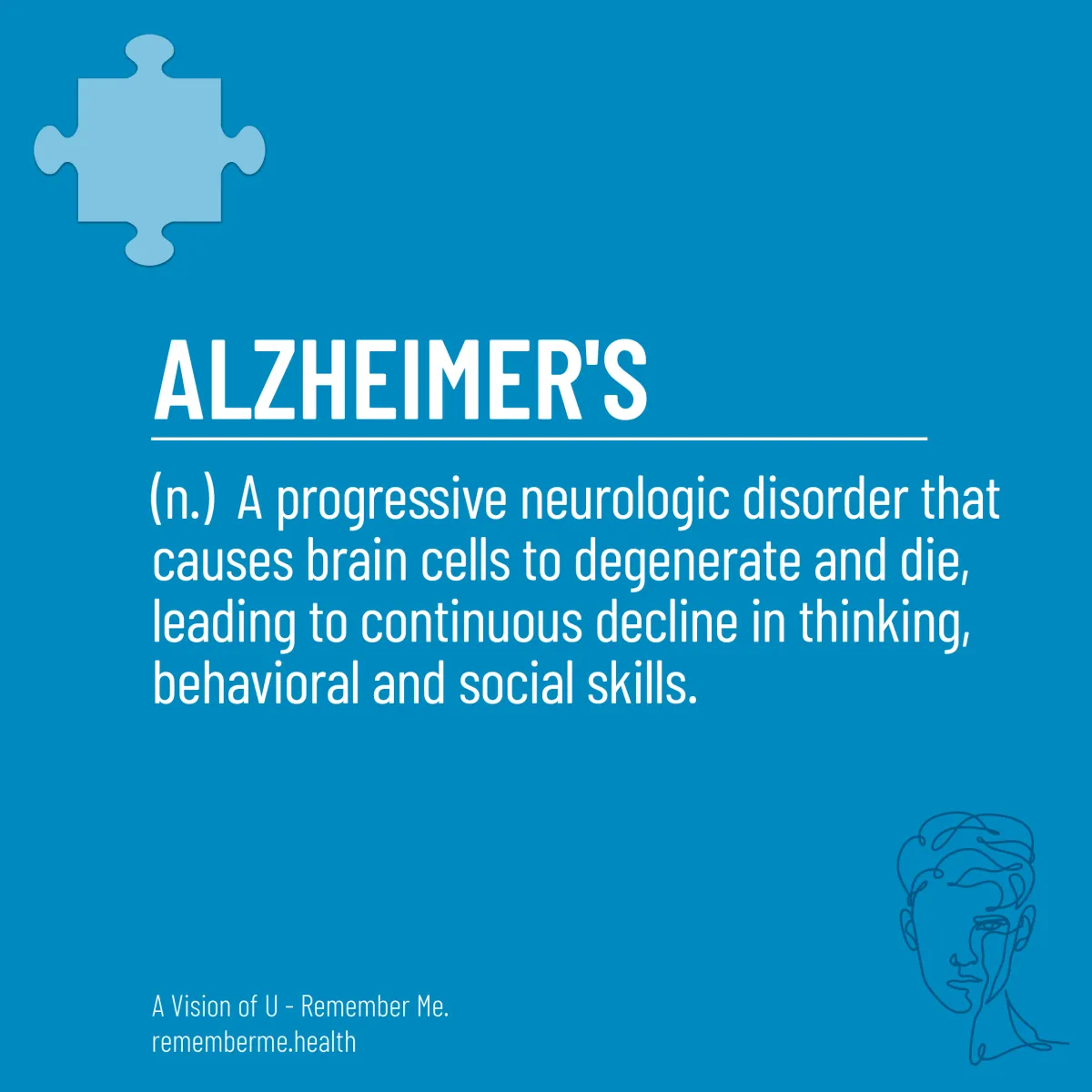
Alzheimer's Disease
(n.) A progressive neurologic disorder that causes brain cells to degenerate and die, leading to continuous decline in thinking, behavioral and social skills.
"Alzheimer's is just one type of dementia, but it's become the boogeyman that stops people from taking action."
Here's what they don't tell you: Alzheimer's accounts for 60-80% of dementia cases, which means 20-40% of people are dealing with something else entirely. But the fear of that one word - Alzheimer's - paralyzes people from investigating what's actually happening in their brain. You're so busy being terrified of the label, you're not addressing the actual problem.
What scares you more - the word "Alzheimer's" or not knowing what's really happening?
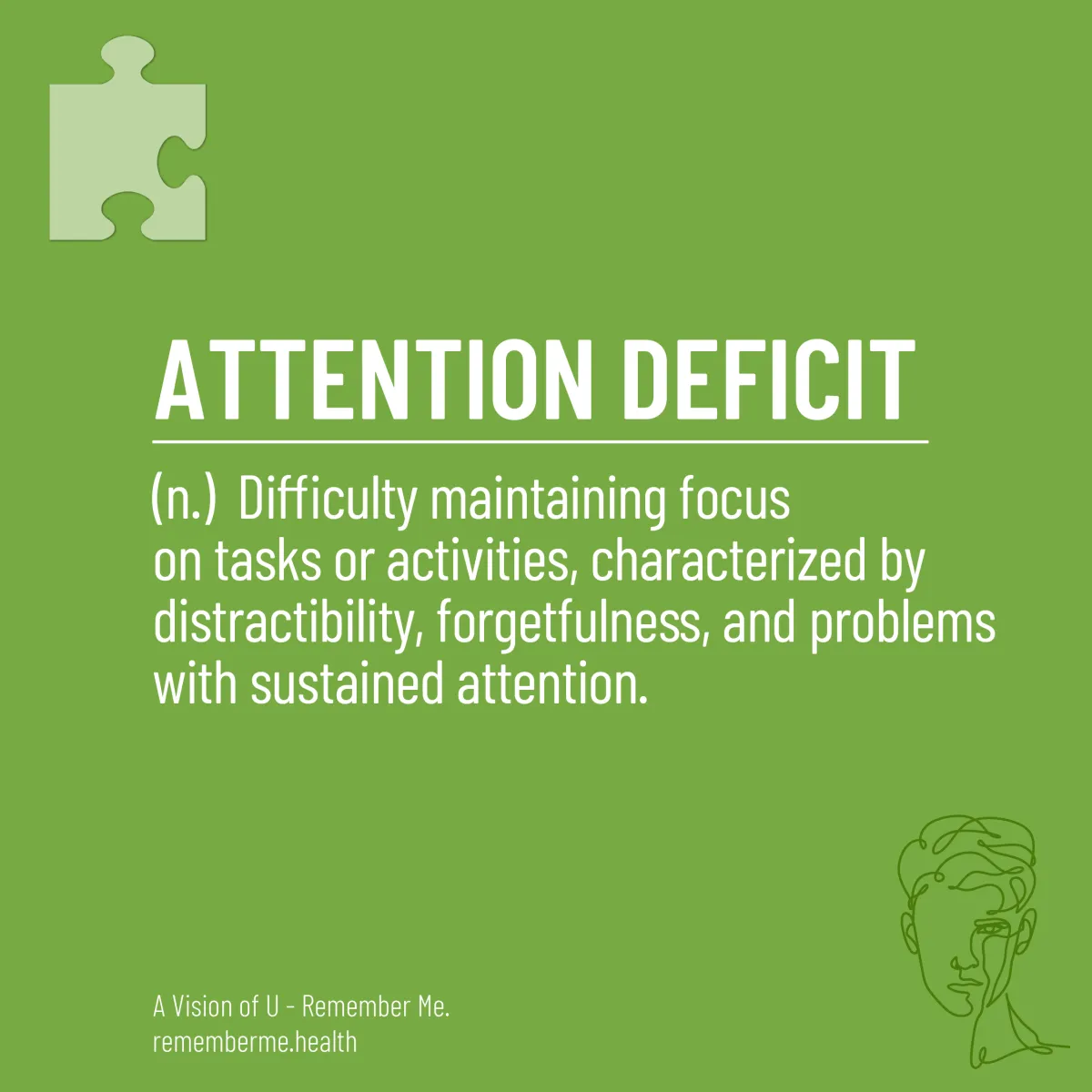
attention deficit
(n.) Difficulty maintaining focus on tasks or activities, characterized by distractibility, forgetfulness, and problems with sustained attention.
“Attention challenges are increasingly common in our distraction-filled world, but there are strategies that can help.”
Finding it harder to concentrate? You’re not alone. Our modern environment, with constant notifications and demands for multitasking, can impact anyone’s ability to focus. Add in factors like stress, poor sleep, or normal aging changes, and attention challenges become very common. The good news is that attention can often be improved through practical strategies: reducing distractions, practicing single-tasking, improving sleep habits, managing stress, and sometimes addressing underlying medical conditions. Small changes in environment and habits can make a meaningful difference.
What’s your biggest distraction when trying to focus? Sometimes identifying the problem is the first step toward a solution.
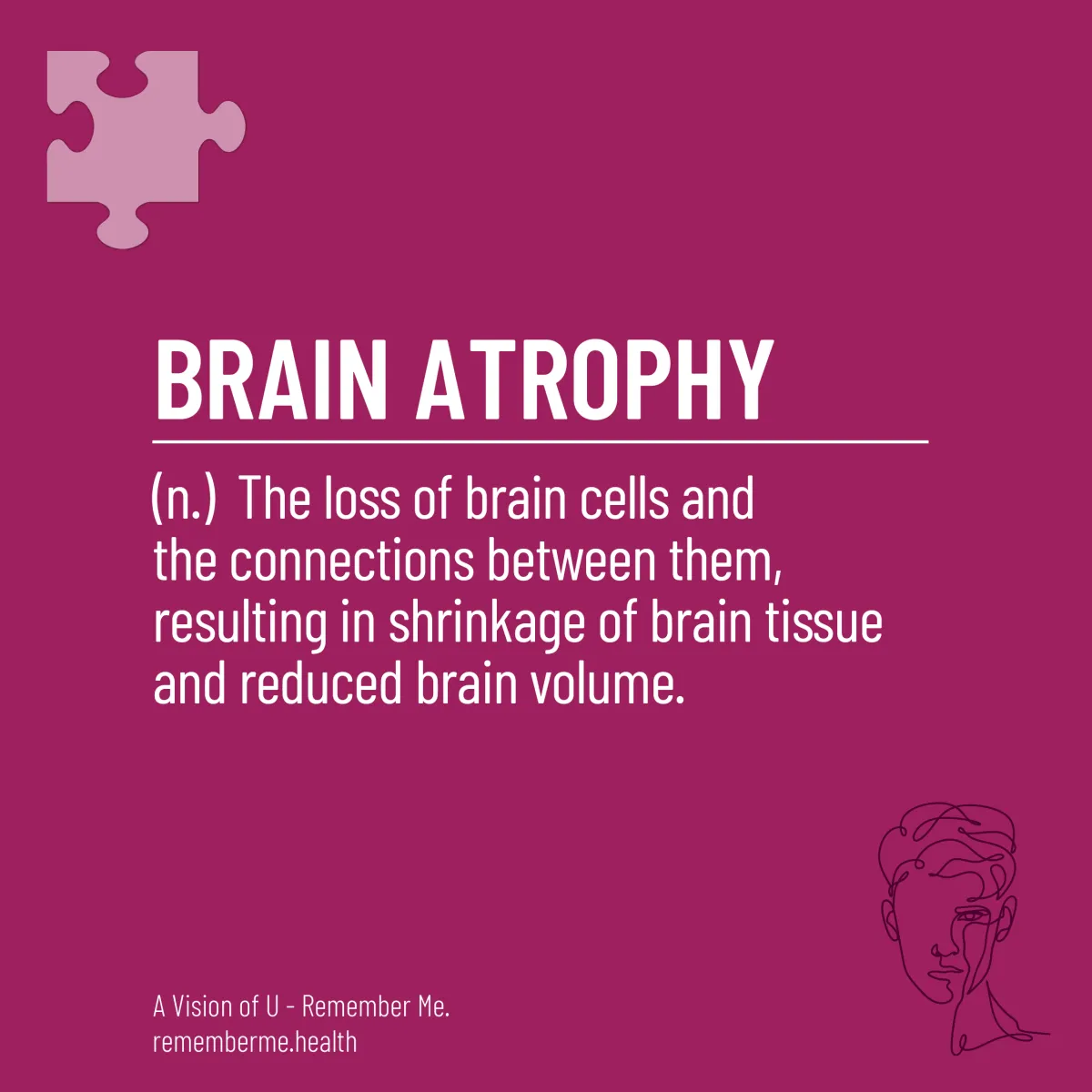
brain atrophy
(n.) The loss of brain cells and the connections between them, resulting in some reduction of brain tissue. While some degree occurs naturally with aging, excessive atrophy may indicate underlying conditions.
“Brain atrophy is part of normal aging for everyone, but significant changes warrant medical attention.”
Some degree of brain volume loss happens to all of us as we age - it’s a normal part of the aging process. However, excessive or rapid atrophy may indicate treatable conditions or neurodegenerative diseases. The important thing is understanding what’s normal versus what needs medical evaluation. Modern brain imaging can help doctors distinguish between normal age-related changes and patterns that suggest specific conditions. If you’re concerned about significant cognitive changes, discussing brain health with your doctor can provide valuable insights and peace of mind.
Regular physical activity, social engagement, and mental stimulation are associated with healthier brain aging. What activities bring you joy while keeping your mind active?
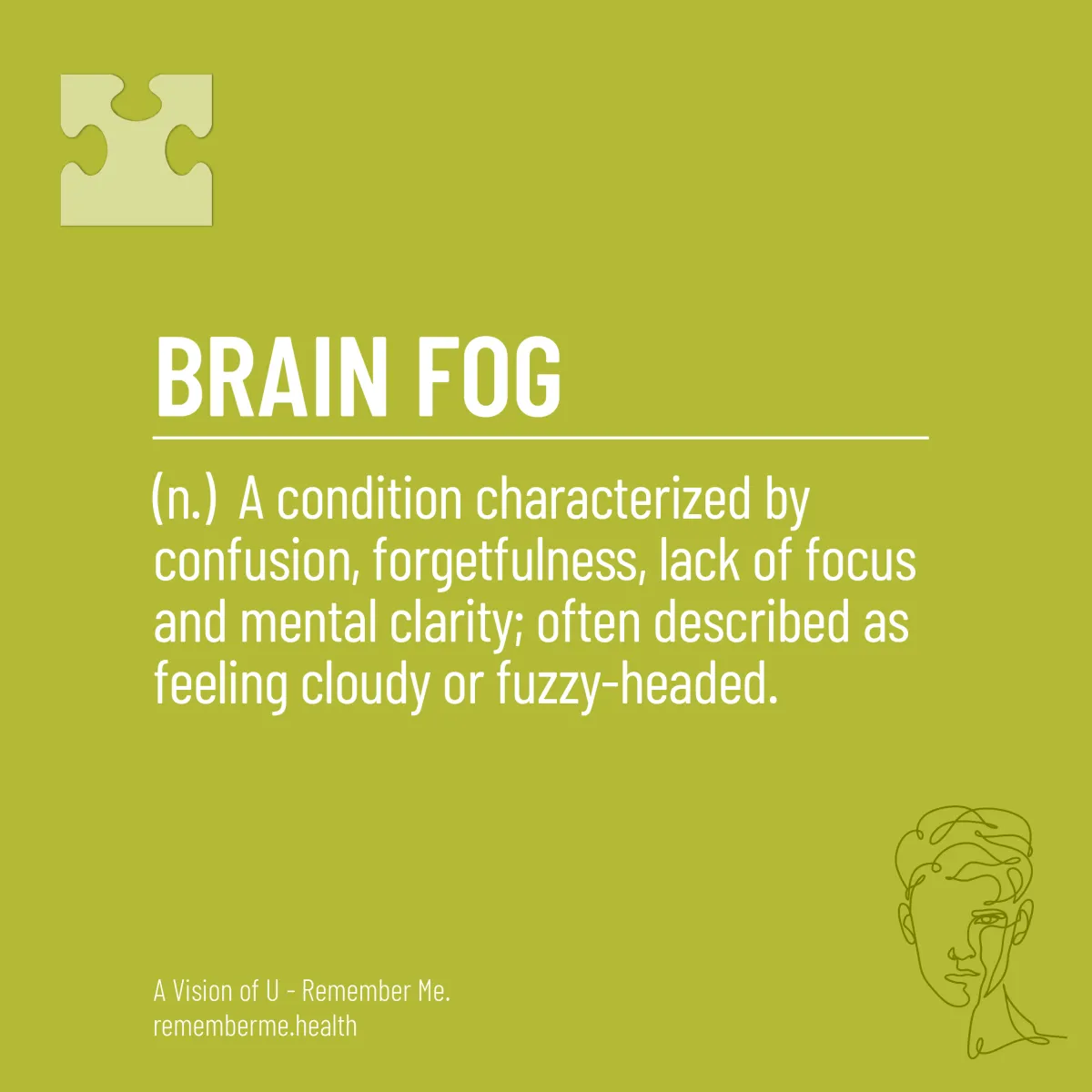
brain fog
(n.) A condition characterized by confusion, forgetfulness, lack of focus and mental clarity; often described as feeling cloudy or fuzzy-headed.
Can result from various factors including stress, sleep deprivation, hormonal changes, medications, or underlying health conditions.
"Brain fog is your body’s way of telling you something needs attention - and there are often solutions.”
Brain fog isn’t just “getting older” - it’s a real symptom that can have identifiable causes. Poor sleep, chronic stress, hormonal changes, certain medications, autoimmune conditions, or nutritional deficiencies can all contribute to that cloudy, unfocused feeling. The good news? Many of these causes are treatable. If you’re experiencing persistent brain fog that interferes with your daily life, it’s worth discussing with your healthcare provider. Simple changes like improving sleep hygiene, managing stress, or adjusting medications can often make a significant difference.
How often do you experience brain fog, and have you identified any patterns or triggers? Sometimes tracking symptoms can provide helpful clues.*
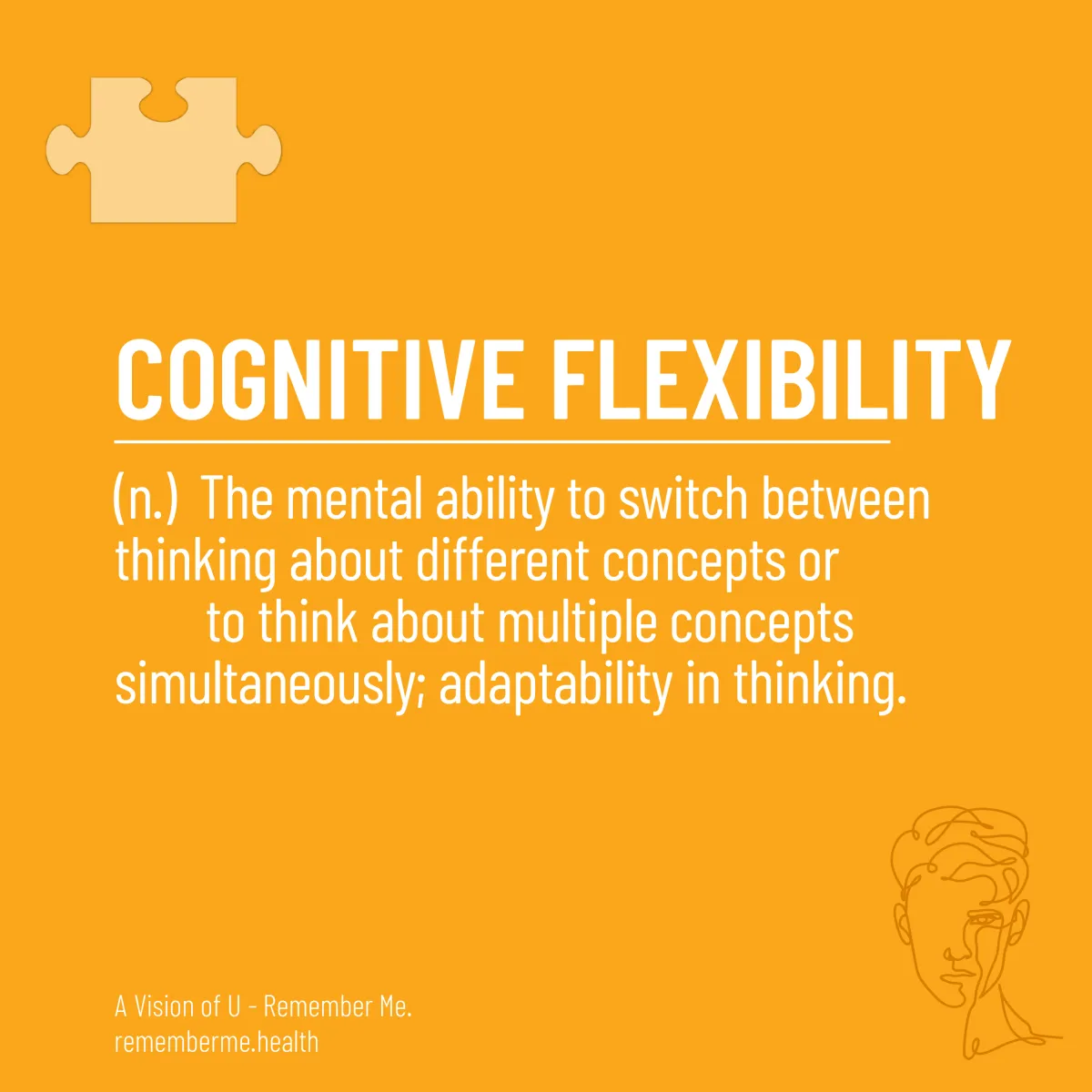
cognitive flexibility
(n.) The mental ability to switch between thinking about different concepts or to think about multiple concepts simultaneously; adaptability in thinking.
"Cognitive flexibility is your brain's ability to adapt. Yours is probably stuck because you've been living the same day for years."
Change the routine and you panic. New technology confuses you. Different ways of doing things feel impossible. That's cognitive inflexibility - your brain got stuck in patterns and lost its ability to adapt. You've been doing the same job, same routes, same thinking patterns for so long that your brain crystallized. Now when life demands flexibility, you crack instead of bend.
What's one thing you refuse to change because "it's always worked before"? That's where you're stuck.
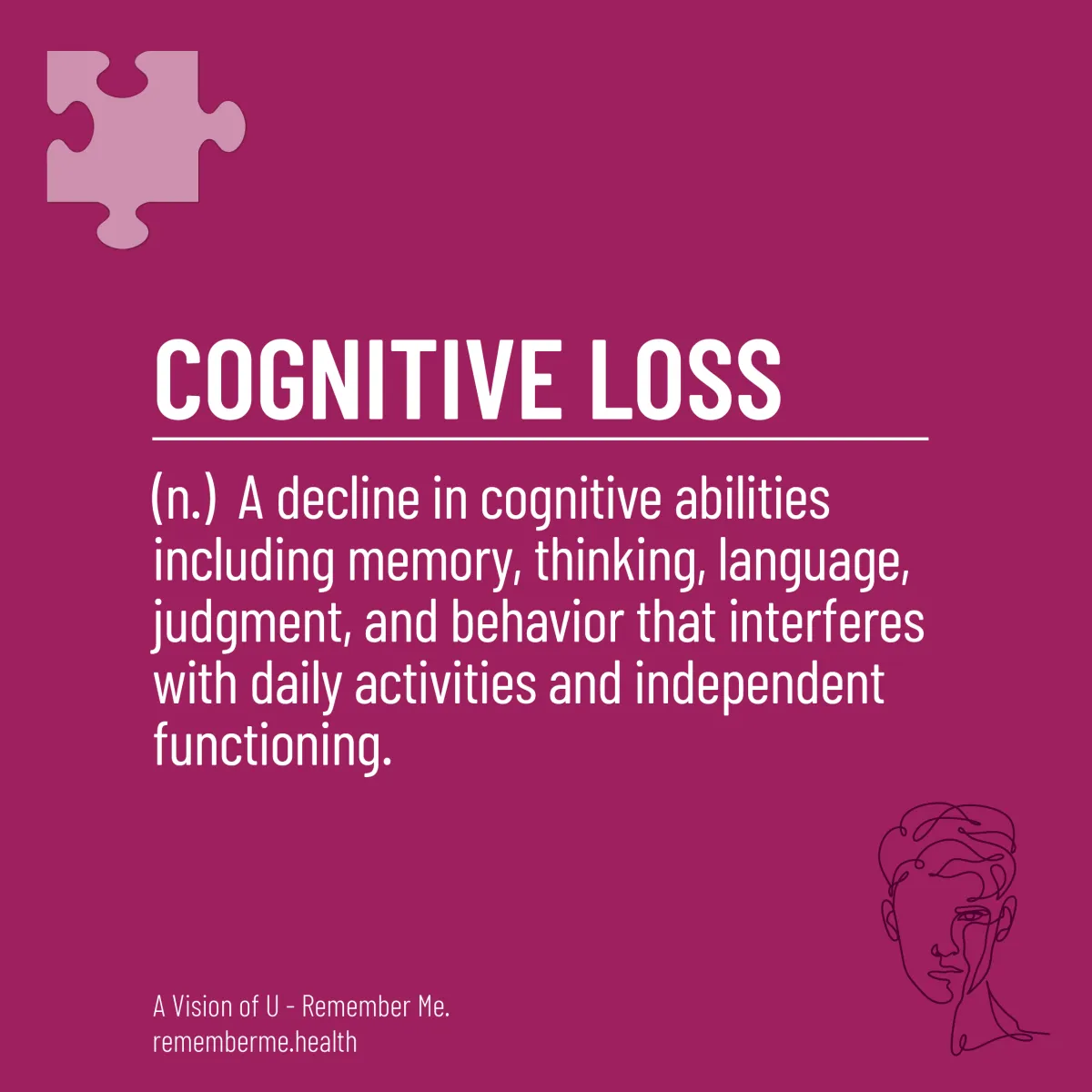
Cognitive Loss
(n.) A decline in cognitive abilities including memory, thinking, language, judgment, and behavior that interferes with daily activities and independent functioning.
"Most people don't even know what 'cognitive loss or cognitive decline' actually means until it's happening to them."
You’ve probably heard this term, but let’s be clear about what it actually means. Cognitive decline exists on a spectrum - from normal age-related changes that don’t significantly impact daily life, to more serious conditions that do require medical attention.
The key is understanding where you or your loved one falls on this spectrum.
Some forms of cognitive decline can be slowed, managed, or even reversed when underlying causes are identified and treated.
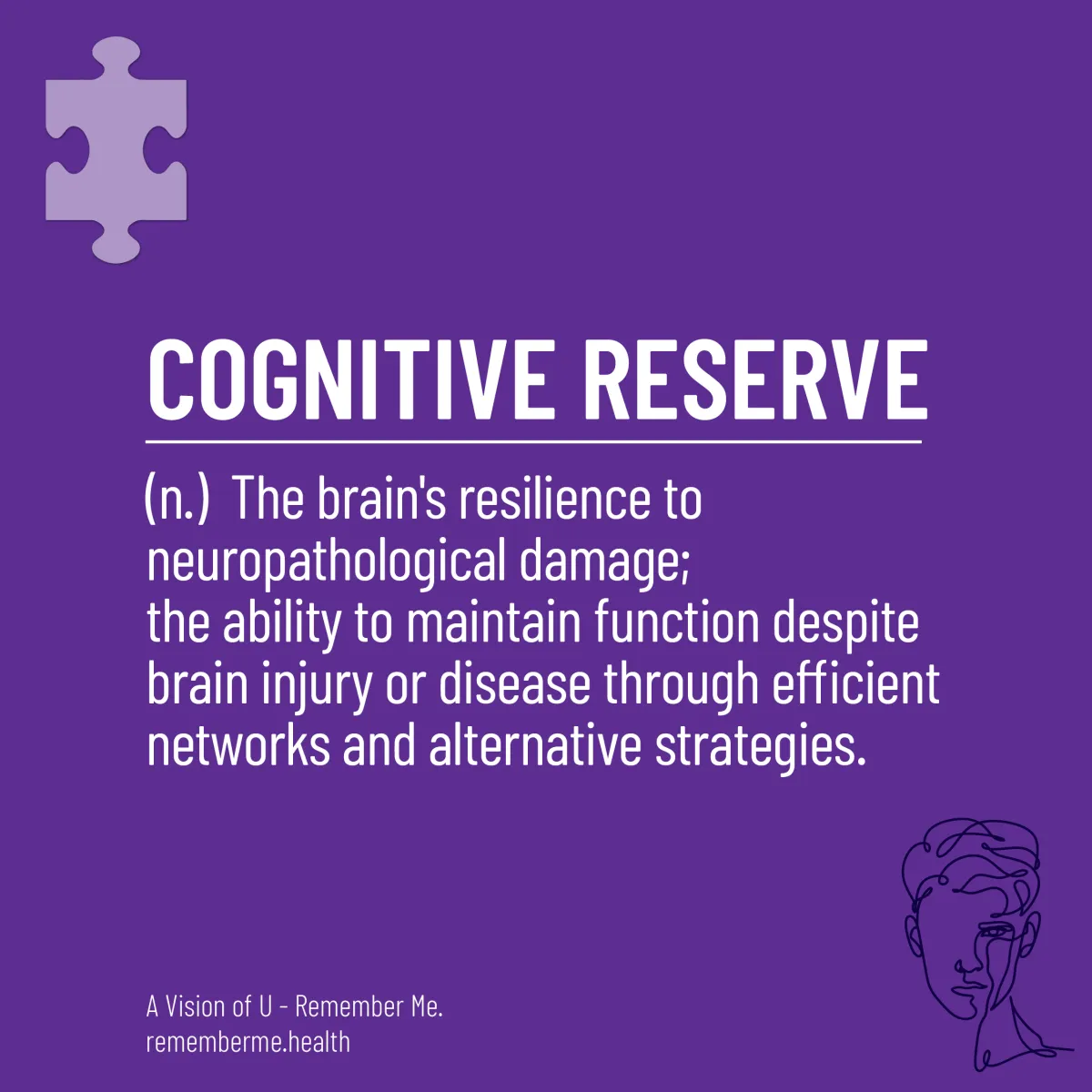
Cognitive reserve
(n.) The brain's resilience to neuropathological damage; the ability to maintain function despite brain injury or disease through efficient networks and alternative strategies. built through lifelong learning and mental stimulation.
“Cognitive reserve is like a savings account for your brain - and it’s never too late to make deposits.”
Research shows that people who stay mentally active throughout life often maintain better cognitive function, even when brain changes occur. Education, challenging work, social connections, learning new skills, and engaging hobbies all contribute to building cognitive reserve. The encouraging news? You can build reserve at any age. Whether it’s learning a new language, taking up a musical instrument, volunteering, or simply staying socially connected, these activities may help create backup systems in your brain. It’s not about being perfect - it’s about staying engaged with life.
What new skill or activity have you always wanted to try? Sometimes the most enjoyable challenges are also the most beneficial for our brains.
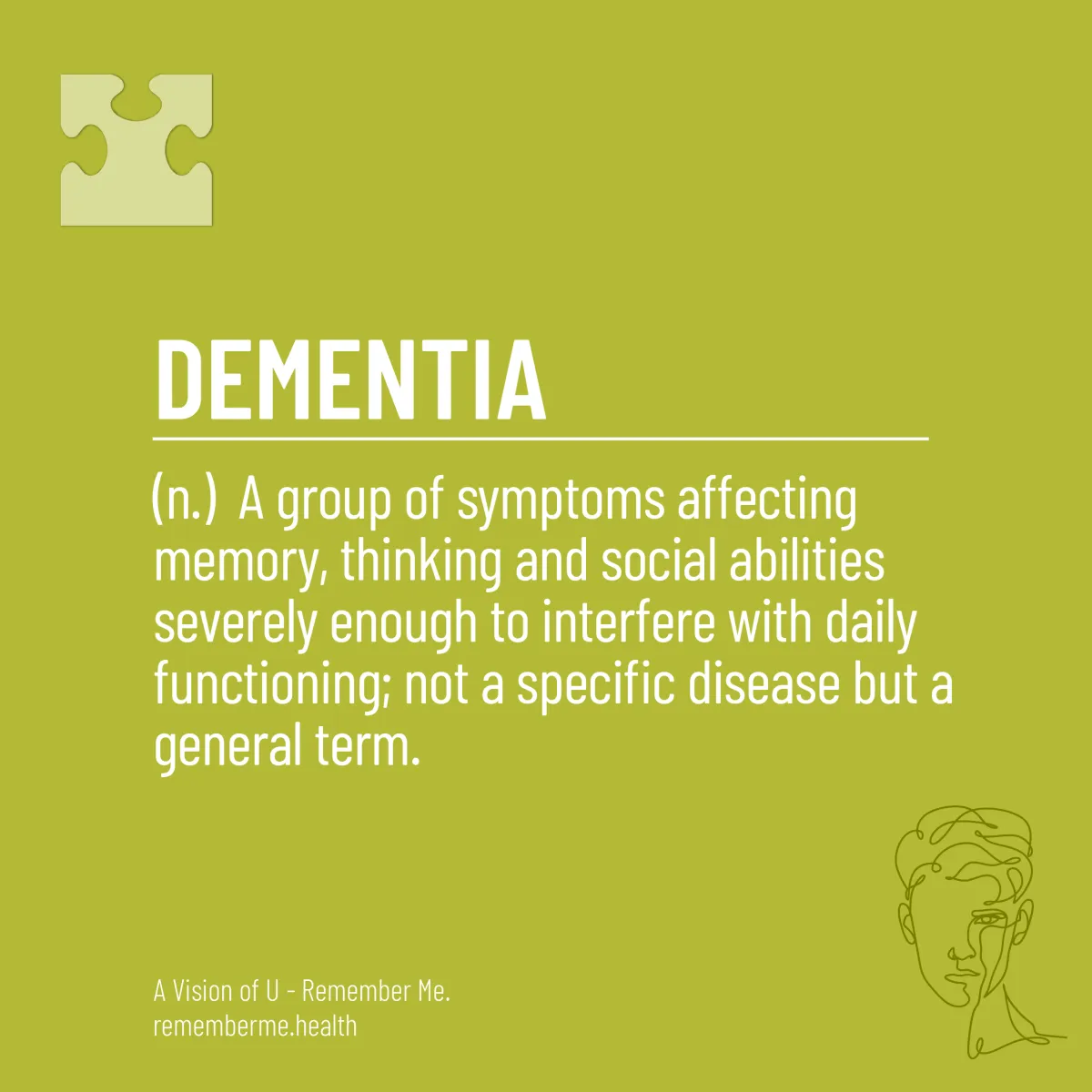
dementia
(n.) A group of symptoms affecting memory, thinking and social abilities severely enough to interfere with daily functioning; not a specific disease but a general term.
"Dementia isn't a disease. This one fact changes everything about how you should think about it."
You've been lied to. Dementia isn't some mysterious disease that strikes randomly. It's a COLLECTION of symptoms. Symptoms have causes. Causes can be addressed. But as long as you think it's just "a disease you get," you'll never look for the real reasons your brain is struggling. And you'll never fight back.
Did you know dementia was a group of symptoms, not a disease?
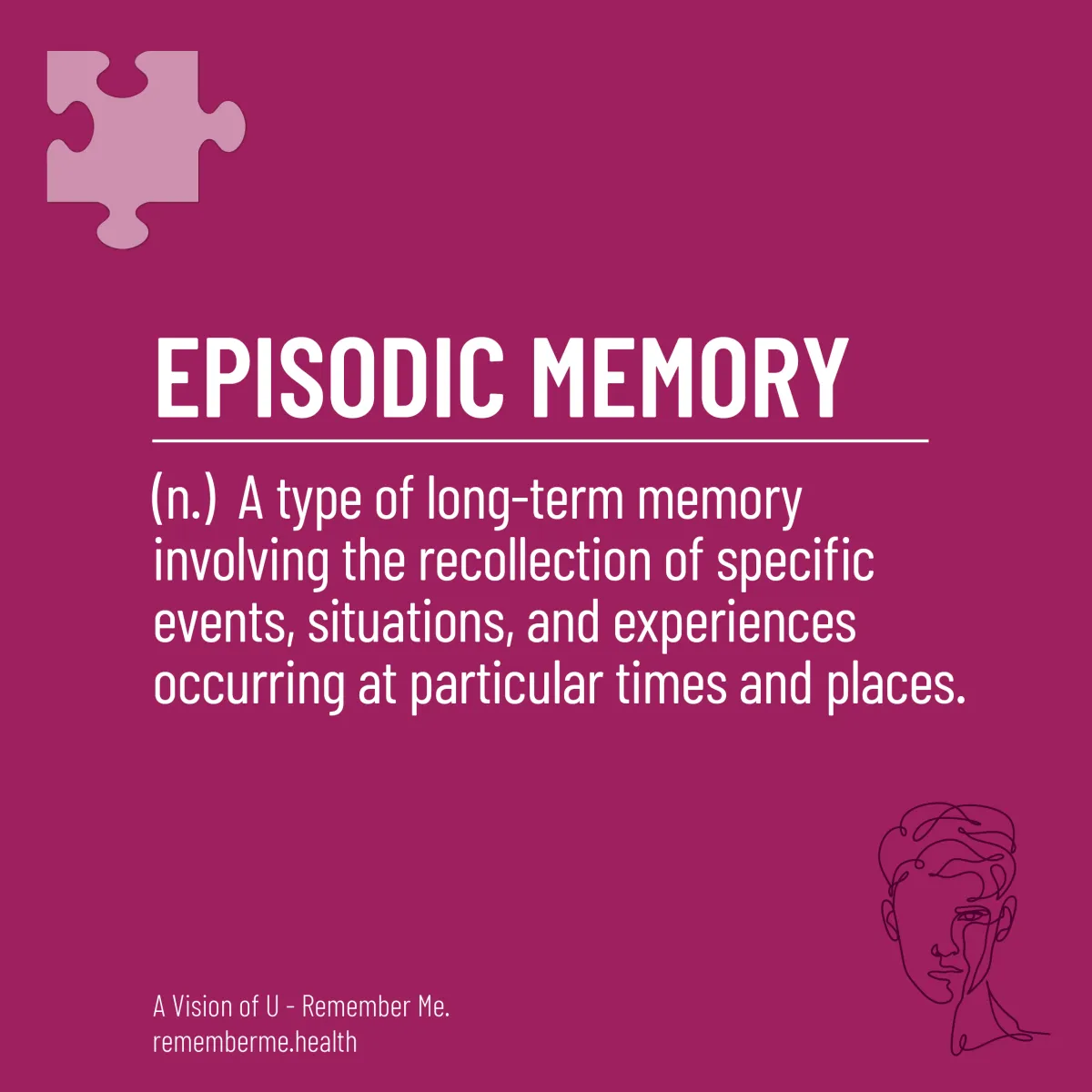
episodic memory
(n.) A type of long-term memory involving the recollection of specific events, situations, and experiences occurring at particular times and places.
"Episodic memory holds the story of your life. When it goes, you don't just forget facts - you lose who you are."
Your first kiss, your wedding day, holding your child for the first time - that's episodic memory. It's not just remembering WHAT happened, it's remembering being THERE, feeling it, living it. When episodic memory fails, you don't just lose information - you lose your life story. You lose the experiences that made you YOU. And every day you don't protect this system, more of your story disappears forever.
What's a precious memory you'd be devastated to lose?
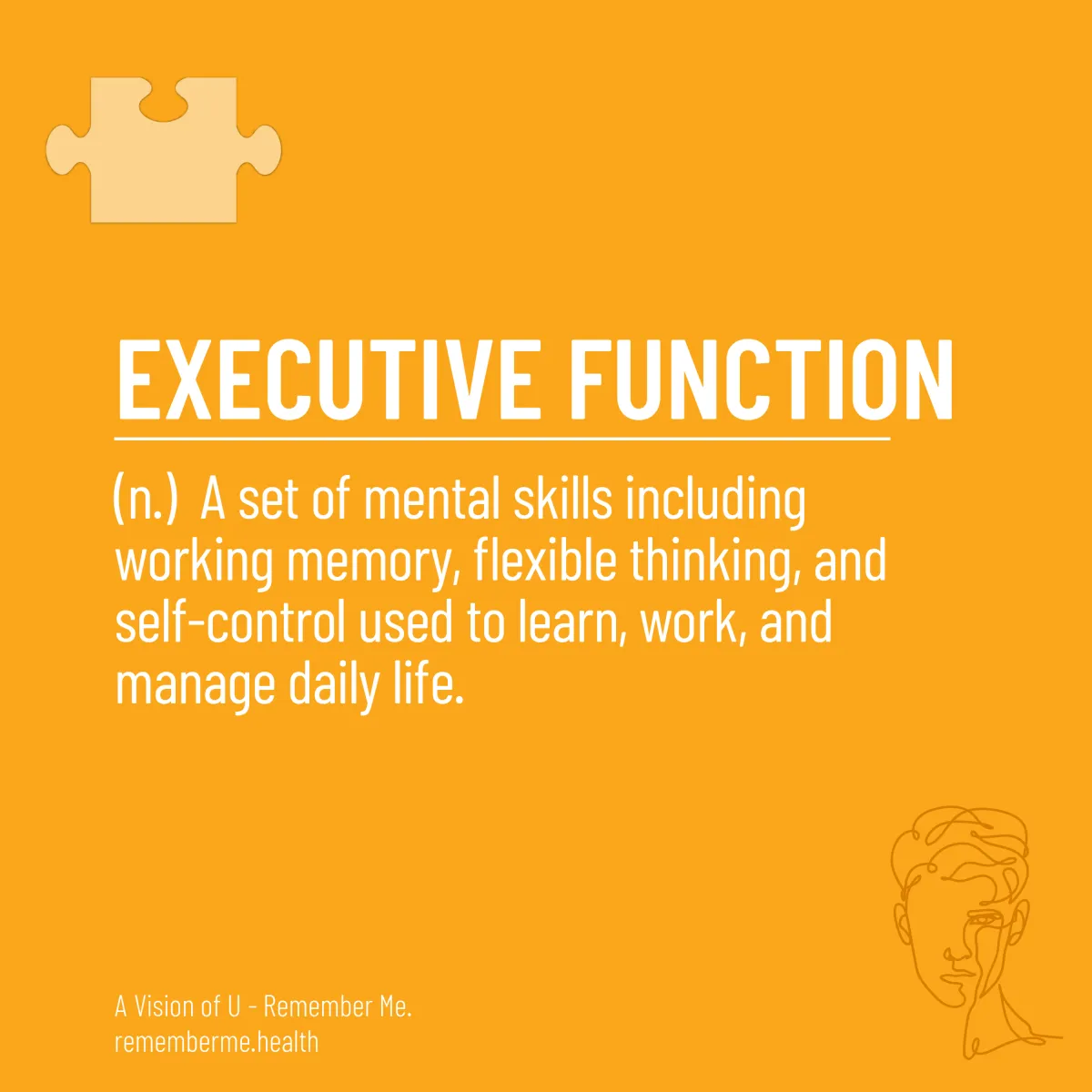
EXECUTIVE FUNCTION
(n.) A set of mental skills including working memory, flexible thinking, and self-control used to learn, work, and manage daily life.
"Executive function is your brain's CEO. And yours might be asleep at the wheel."
Planning, organizing, managing time, controlling impulses - that's executive function. It's literally your brain's management system. When it starts failing, everything else falls apart. But here's the kicker: most people don't even know this system exists, let alone how to strengthen it. You're trying to fix memory when the real problem is your brain's management system is broken.
Which area is weakest for you: planning, organizing, time management, or impulse control?
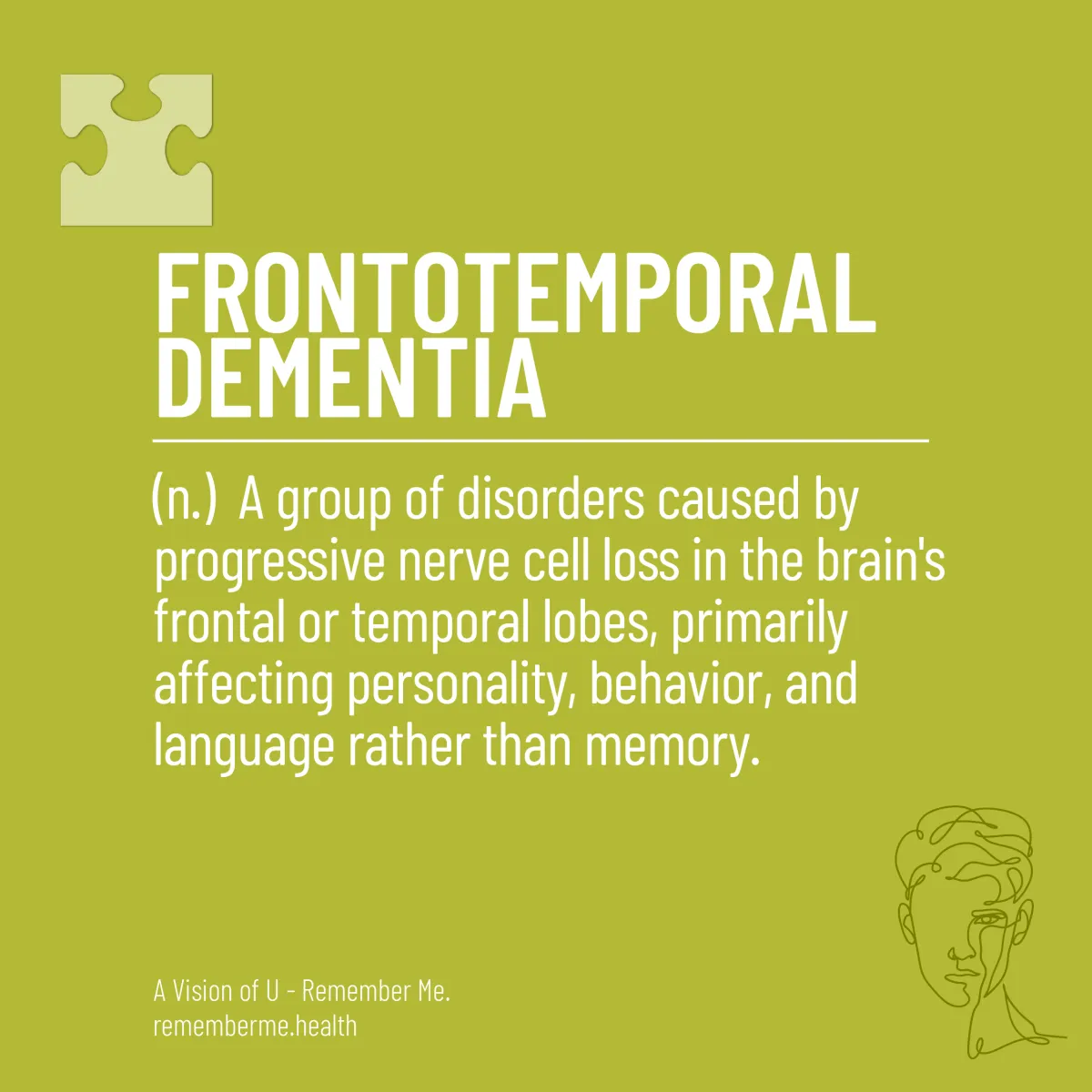
Frontotemporal Dementia
(n.) A group of disorders caused by progressive nerve cell loss in the brain's frontal or temporal lobes, primarily affecting personality, behavior, and language rather than memory.
"Frontotemporal Dementia steals your personality first. Your family watches you become a stranger while your memory stays intact."
This is the dementia that hits people in their 40s, 50s, and 60s. It doesn't touch memory initially - it erases who you ARE. Suddenly you're crude, impulsive, socially inappropriate. You lose empathy, make terrible decisions, say things that shock your family. They watch the person they love disappear while you remember everything perfectly. You become a stranger wearing a familiar face.
What personality trait would your family miss most if it disappeared?
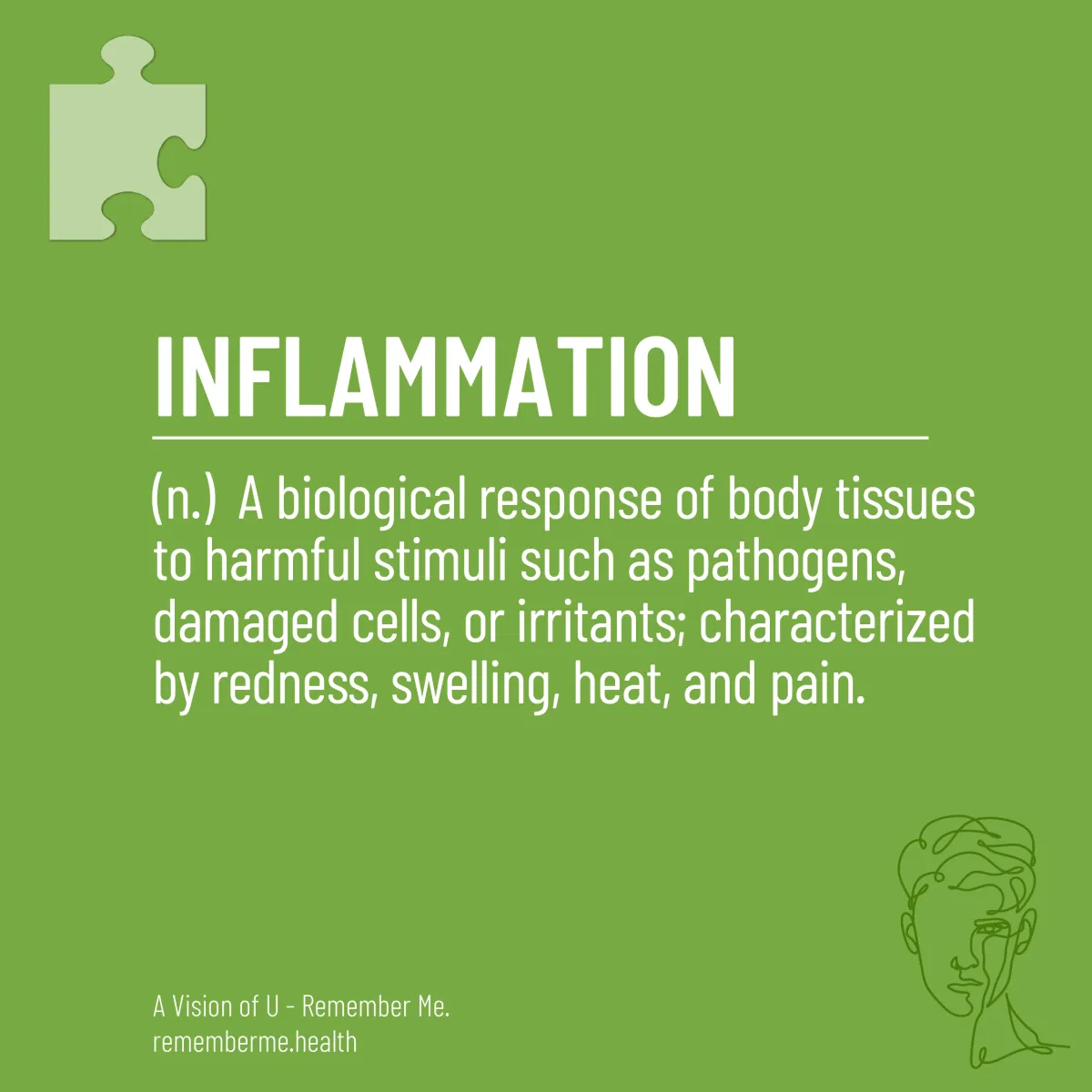
inflammation
(n.) A biological response of body tissues to harmful stimuli such as pathogens, damaged cells, or irritants; characterized by redness, swelling, heat, and pain.
Chronic inflammation may contribute to various health conditions including cognitive decline.
"Inflammation in your brain is invisible, silent, and destroying your cognitive function right now."
Inflammation is your body’s natural healing response, but when it becomes chronic, it may contribute to various health issues, including some forms of cognitive decline.
Multiple factors can influence inflammation levels - some we can control (like diet, exercise, sleep, and stress management) and others we cannot (like genetics and age).While lifestyle factors matter, it’s important to remember that inflammation and cognitive health are complex topics influenced by many variables. The goal isn’t perfection, but rather making sustainable, healthy choices when possible.
What’s one positive change you’ve made (or are considering) for your overall brain health? Small steps can add up over time.
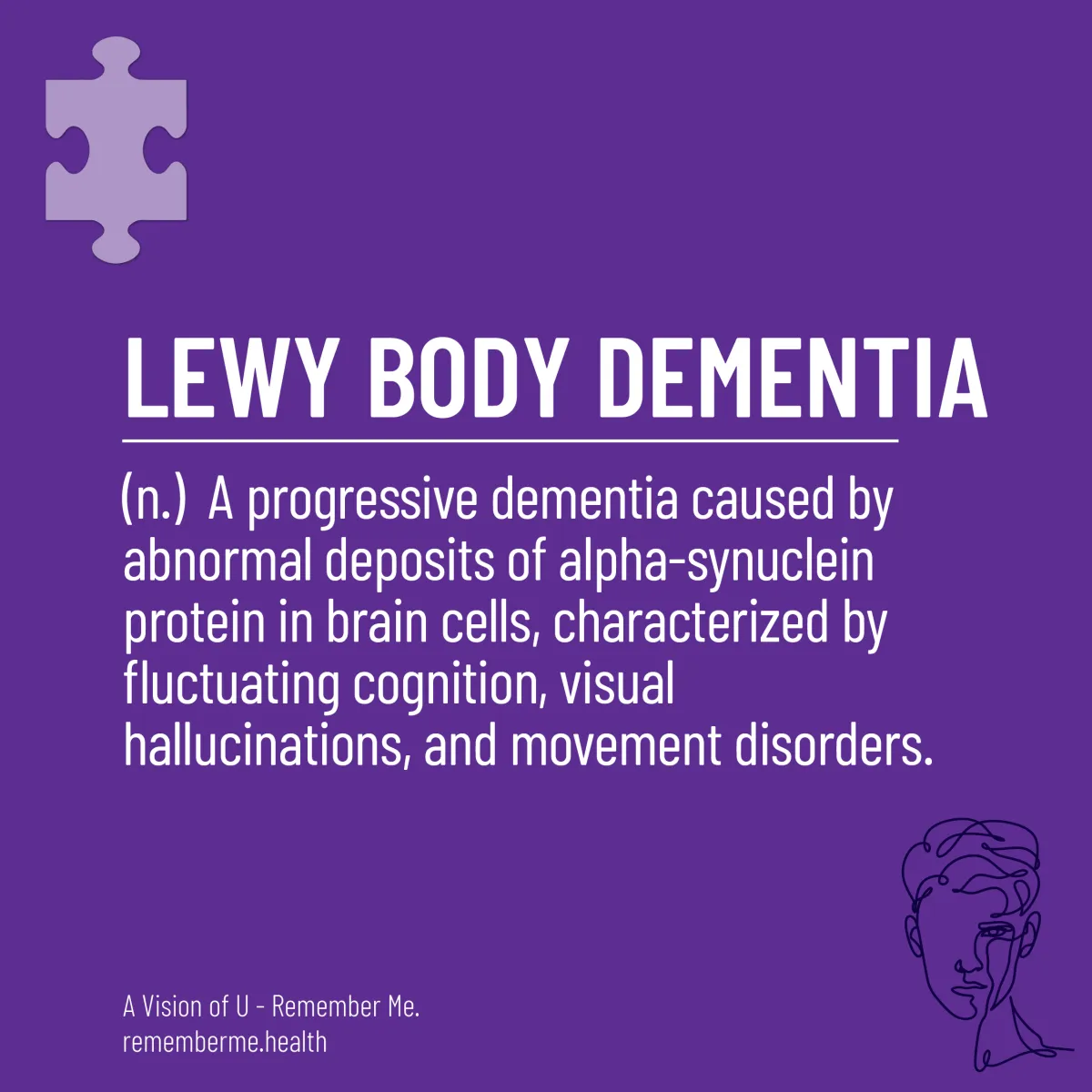
Lewy Body Dementia
(n.) A progressive dementia caused by abnormal deposits of alpha-synuclein protein in brain cells, characterized by fluctuating cognition, visual hallucinations, and movement disorders.
You think dementia is just memory loss? Lewy Body Dementia comes with vivid hallucinations - seeing people who aren't there, having conversations with the dead, believing strangers are living in your house.
Add Parkinson's-like tremors and cognitive abilities that swing from normal to severely impaired within hours. It's not just losing your mind - it's your brain creating an alternate reality while your body stops working.
Did you know dementia could include hallucinations?
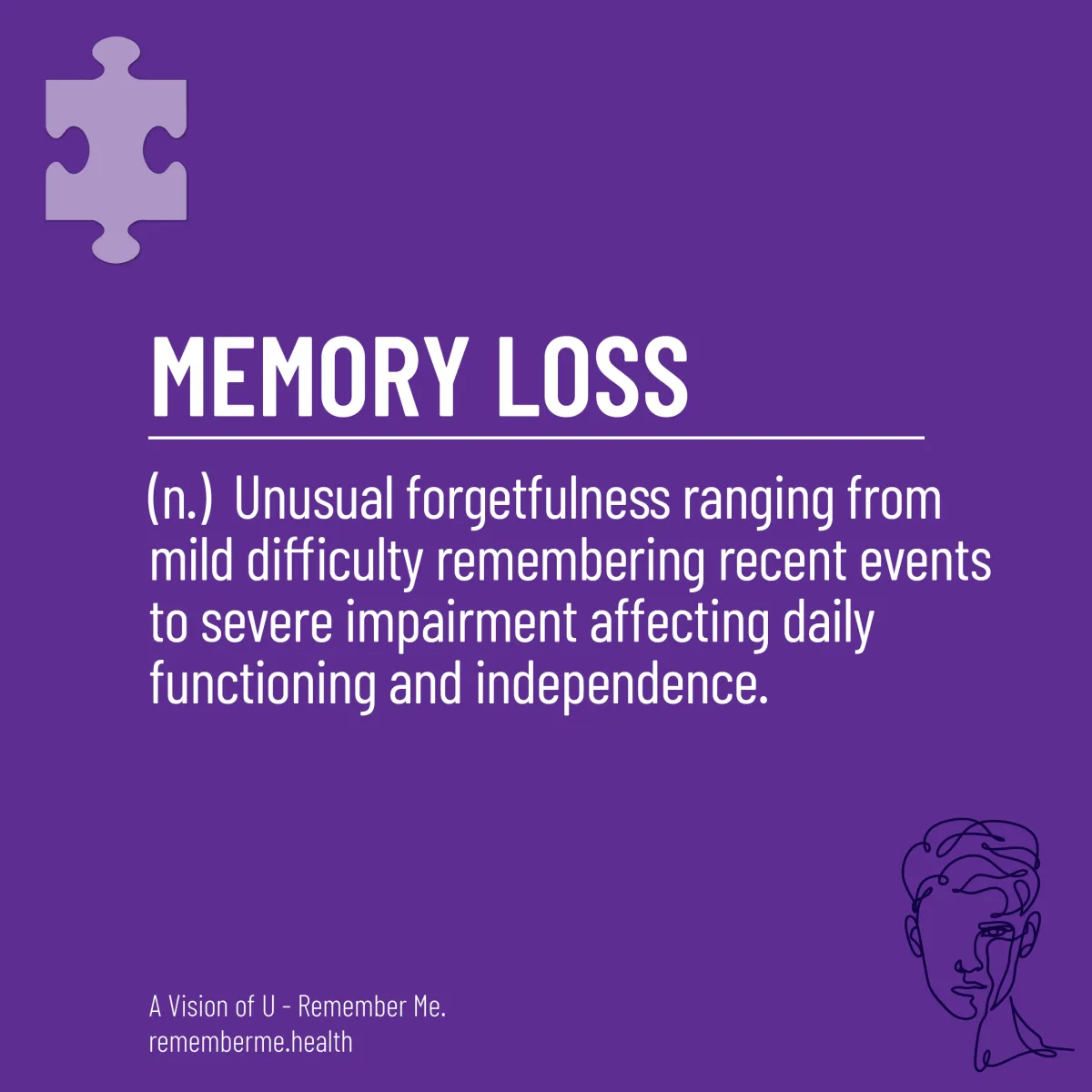
memory loss
(n.) Unusual forgetfulness ranging from mild difficulty remembering recent events to severe impairment affecting daily functioning and independence.
"Not all memory loss is the same. But you're treating it like it is - and that's making it worse."
There's normal forgetfulness, age-related memory changes, mild cognitive impairment, and severe memory loss. They're NOT the same thing. They don't have the same causes. They don't need the same solutions. But you're panicking about forgetting where you put your keys like it's the same as forgetting your daughter's name. Stop treating all memory loss the same.
What type of memory loss are you actually dealing with?
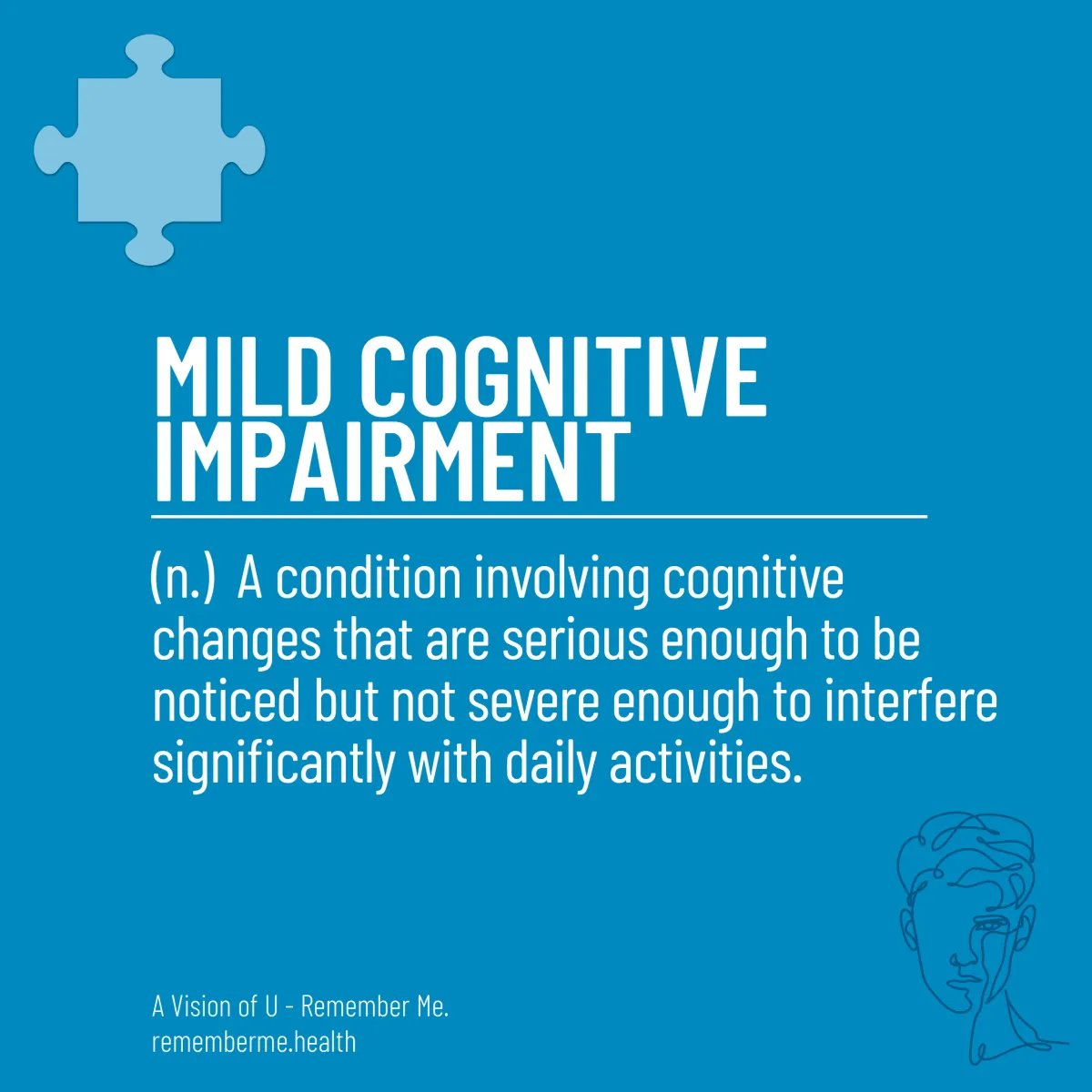
MILD COGNITIVE IMPAIRMENT
(n.) A condition involving cognitive changes that are serious enough to be noticed but not severe enough to interfere significantly with daily activities.
"MCI is the warning shot your brain fires before things get serious. Most people ignore it completely."
Mild Cognitive Impairment is your brain's yellow light. It's saying "something's wrong, but I can still function." This is your window. Your opportunity. Your chance to turn things around before they get worse. But most people treat MCI like it's no big deal because the word "mild" makes them think it's harmless. It's not mild. It's a warning.
If you have MCI, what action have you taken?
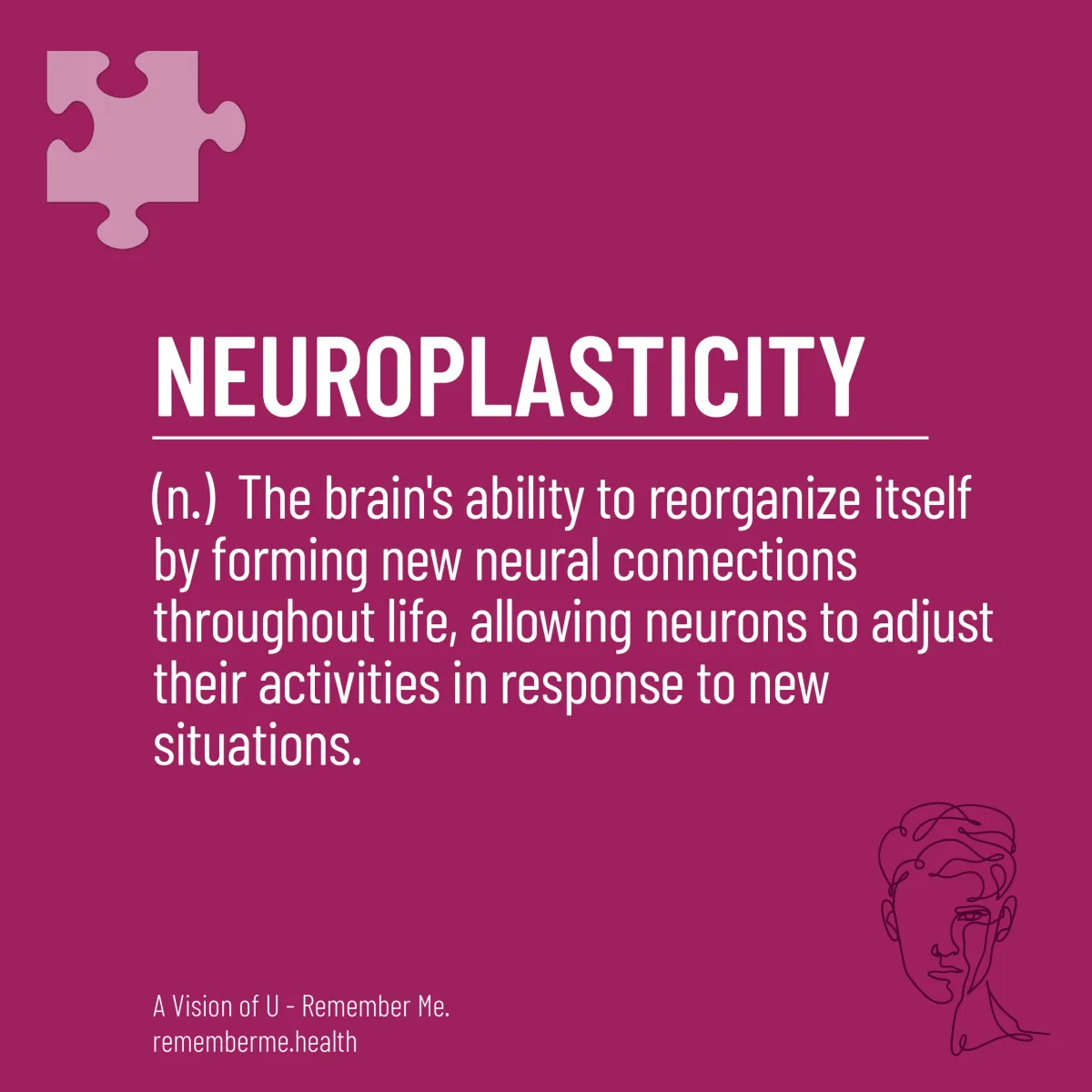
NEUROPLASTICITY
(n.) The brain's ability to reorganize itself by forming new neural connections throughout life, allowing neurons to adjust their activities in response to new situations.
"Neuroplasticity is proof your brain can change. But nobody told you how to actually use it."
Your brain can rewire itself at ANY age. New connections, new pathways, new possibilities. But you've been told it's too late, too damaged, too far gone. That's not science - that's surrender. Neuroplasticity means your brain is plastic, moldable, changeable right now. The question isn't whether it CAN change. The question is: will you give it what it needs to change?
What would you do if you truly believed your brain could change?
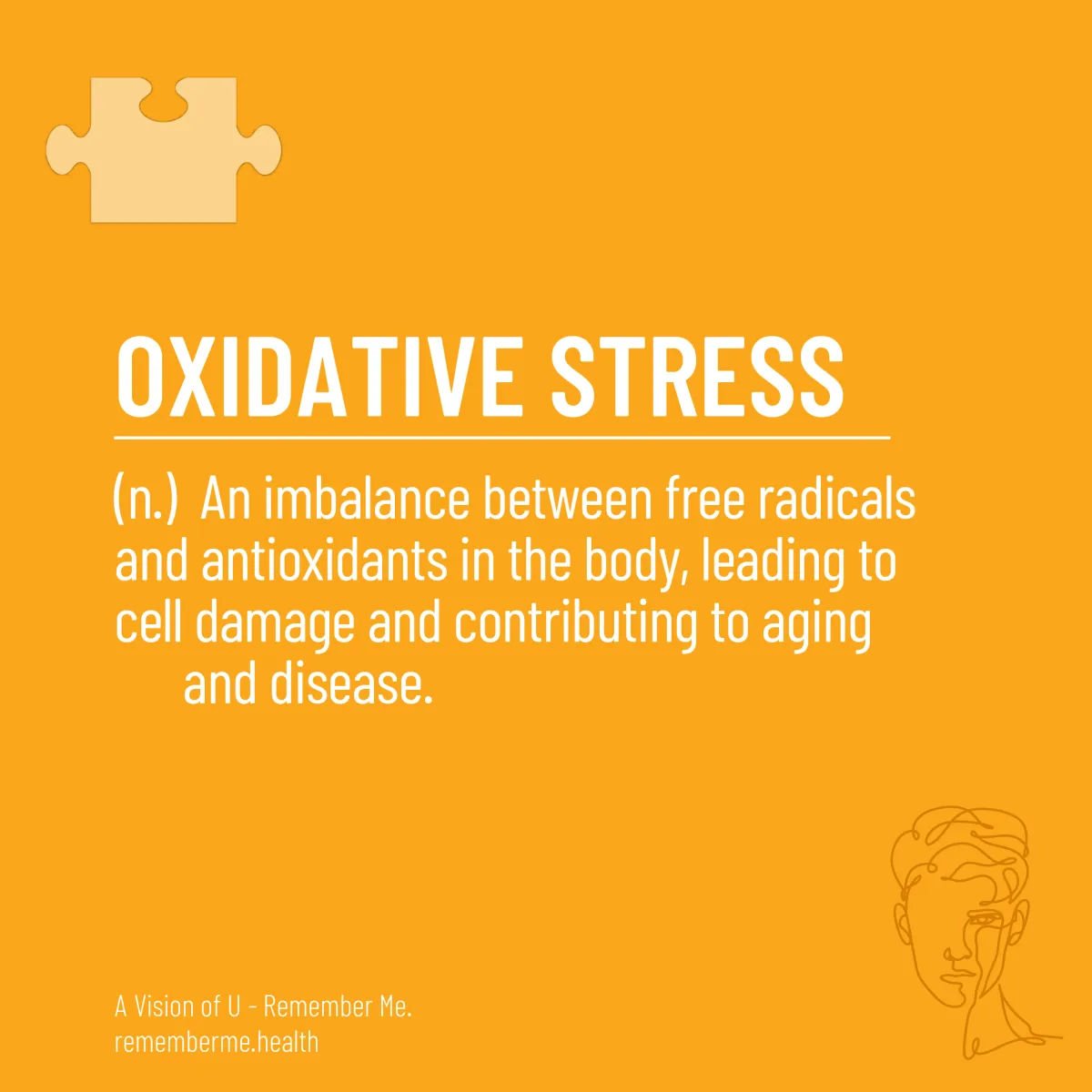
oxidative stress
n.) An imbalance between free radicals and antioxidants in the body, leading to cell damage and contributing to aging and disease.
This process is influenced by aging, genetics, environmental factors, and lifestyle choices.
"Oxidative stress affects all of us as we age, but there are evidence-based ways to support our body’s natural defenses."
Think of oxidative stress as natural cellular wear and tear that happens to everyone over time. While we can’t stop this process entirely (it’s part of aging), research suggests that certain lifestyle factors may help support our body’s natural antioxidant systems. Regular exercise, a diet rich in fruits and vegetables, adequate sleep, and stress management may all play a role. Remember, oxidative stress is just one of many factors that influence brain health, along with genetics, age, and medical conditions. The goal is balance, not perfection.
What antioxidant-rich foods do you enjoy? Sometimes the healthiest choices are also the most delicious.
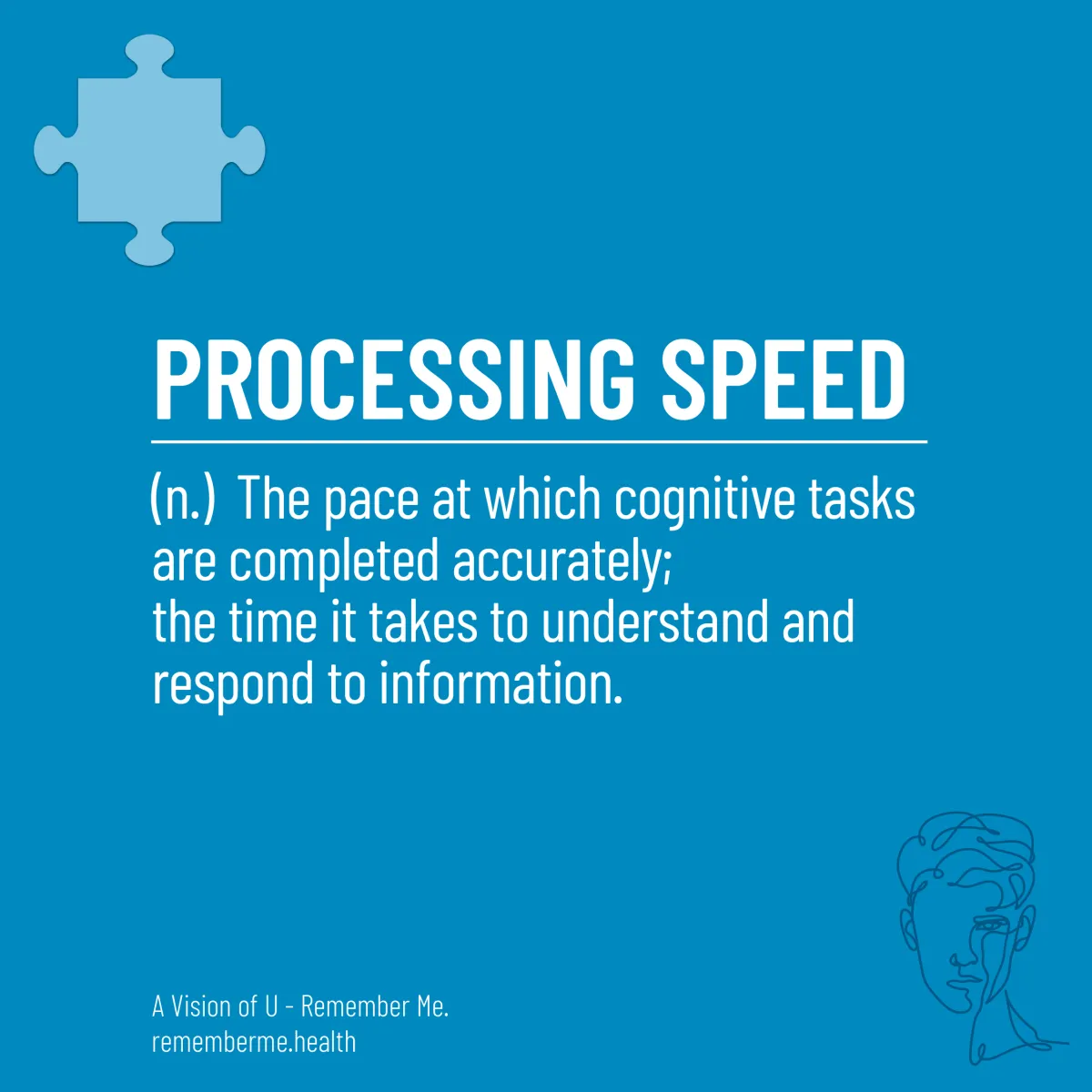
processing speed
(n.) The pace at which cognitive tasks are completed accurately; the time it takes to understand and respond to information.
"Processing speed is why everything feels harder now. Your brain isn't broken - it's just running on dial-up while the world runs on fiber optic."
You used to be quick. Sharp. Now simple decisions take forever. You need more time to understand things. You feel slower in conversations. That's processing speed decline, and it makes you feel stupid even when your knowledge is still there. Your brain is like an old computer - all the files are there, but it takes forever to access them. And you've been running too many programs at once for years.
What takes you twice as long now as it used to? Be specific - don't just say "everything."
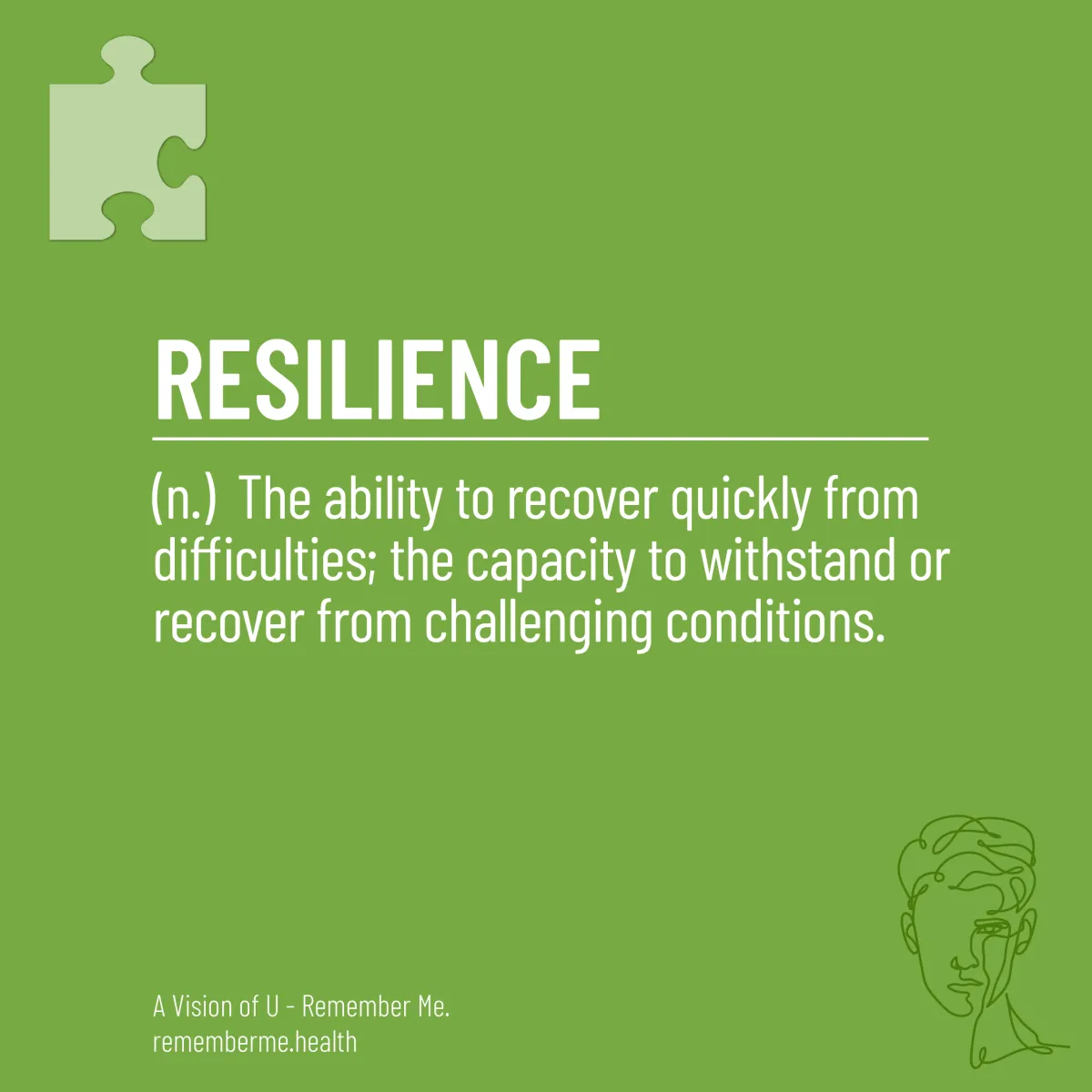
RESILIENCE
(n.) The ability to recover quickly from difficulties; the capacity to withstand or recover from challenging conditions.
"Your brain has resilience you've never tapped into. But you're too busy focusing on what's broken to use it."
Every day you wake up thinking about what your brain CAN'T do, you're training it to be weaker. Resilience isn't just bouncing back - it's your brain's ability to find new pathways, create new connections, and work around damaged areas. But you have to activate it. You have to demand it. You have to stop babying your brain and start challenging it.
When did you last challenge your brain instead of protecting it?
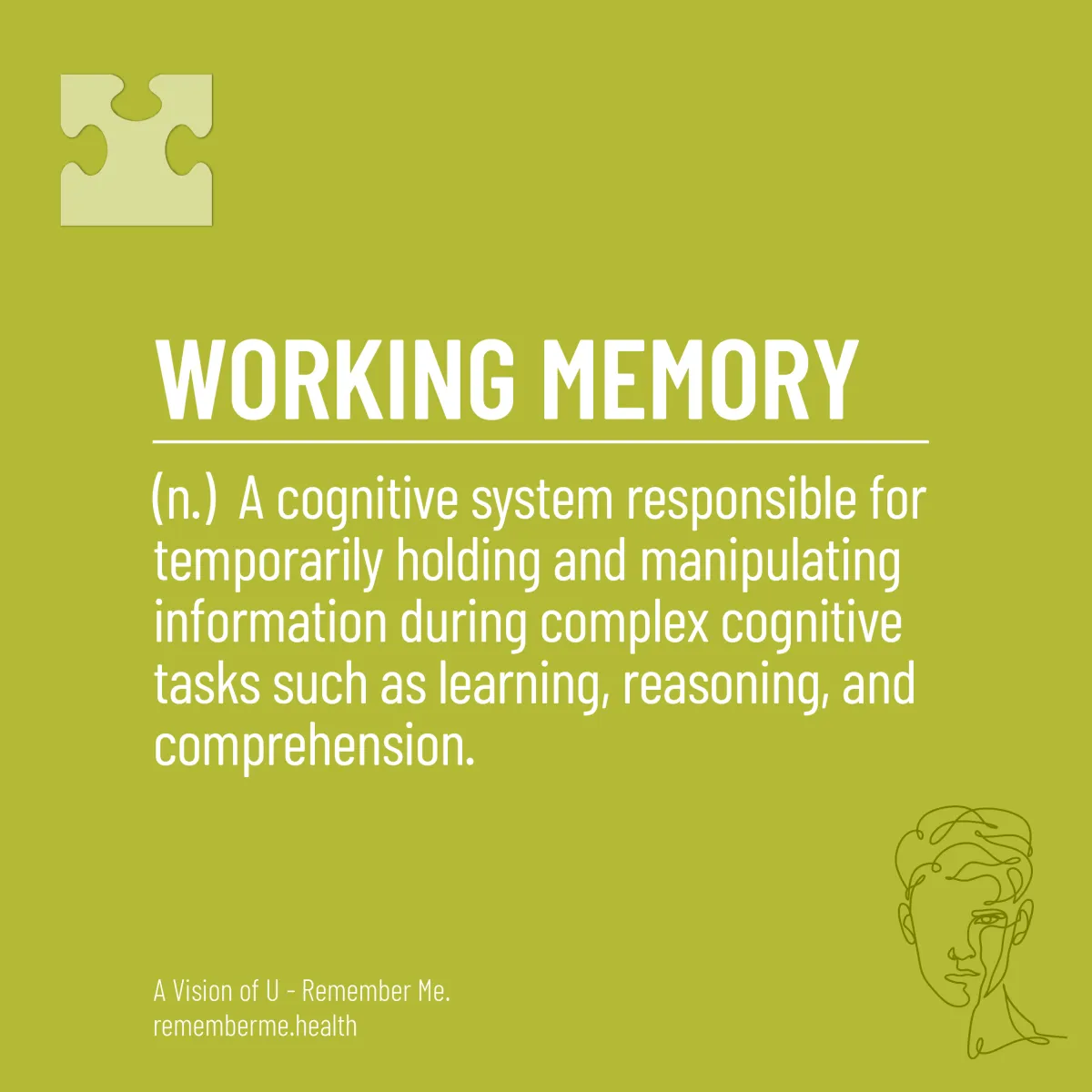
working memory
(n.) A cognitive system responsible for temporarily holding and manipulating information during complex cognitive tasks such as learning, reasoning, and comprehension.
"Working memory is your brain's sticky notes. Yours keep falling off because you're not taking care of the system."
Working memory is how you hold information in your mind while you use it. Following a recipe, doing math in your head, remembering what someone just told you while you respond - that's working memory. When it fails, everything feels impossible because you can't hold onto thoughts long enough to work with them. And yours is failing because you've been overloading it with stress and multitasking for years.
What simple task feels harder now because you can't hold the steps in your mind?
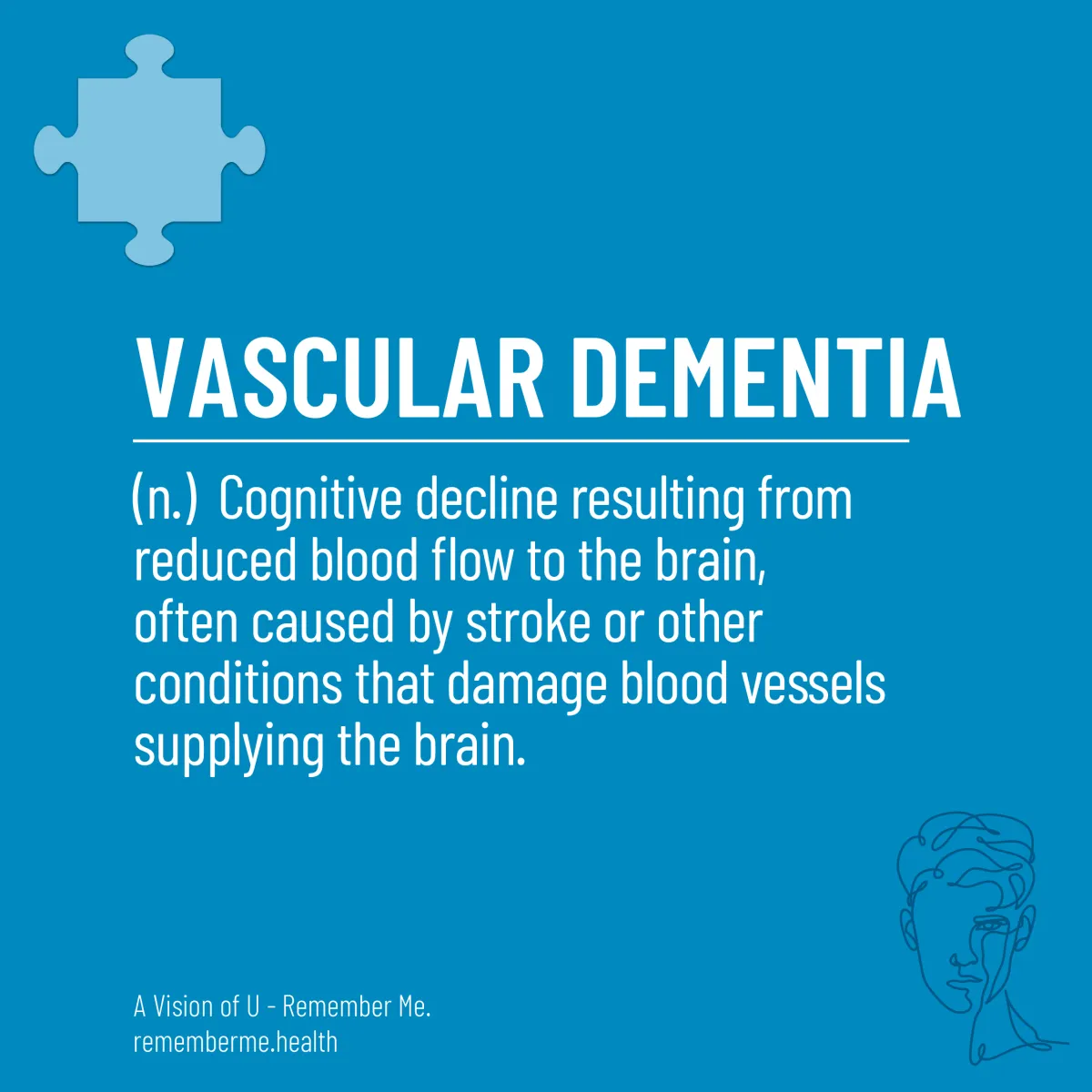
VASCULAR DEMENTIA
(n.) Cognitive decline resulting from reduced blood flow to the brain, often caused by stroke or other conditions that damage blood vessels supplying the brain.
"Vascular dementia is caused by tiny strokes you don't even know you're having. Your lifestyle choices are starving your brain of blood."
Every cigarette, every high-blood-pressure day, every moment of sitting still is damaging the blood vessels feeding your brain. Micro-strokes so small you don't feel them are killing brain tissue bit by bit. Your brain is literally starving for blood while you make the same lifestyle choices that created the problem. This isn't mysterious - it's completely preventable. And completely your fault.
Rate your vascular health honestly: blood pressure, exercise, smoking, diet. What grade would you give yourself?
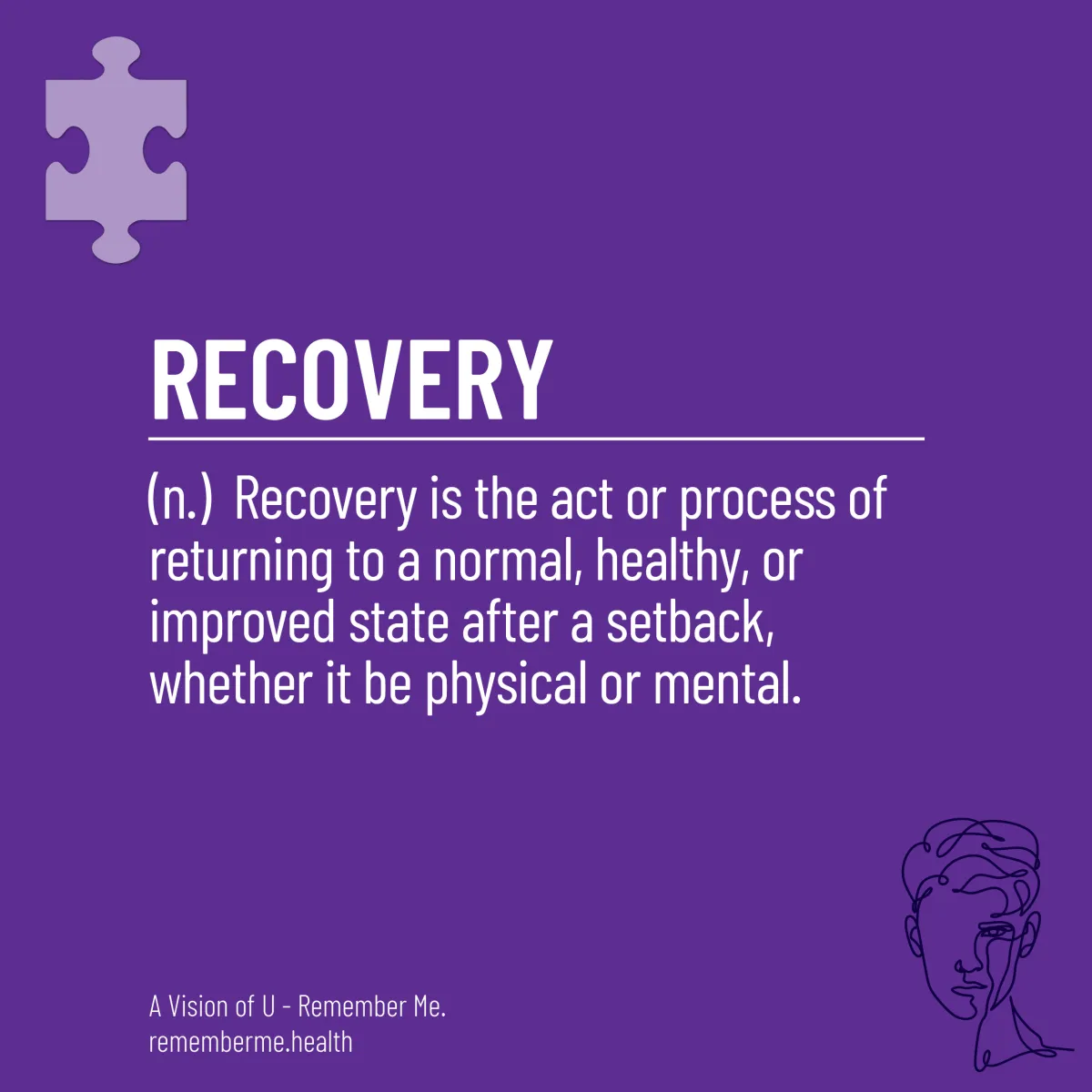
Recovery
(n.) The process of returning to a normal state of health, mind, or strength; regaining something lost or taken away.
"The word 'recovery' is banned from most conversations about cognitive loss. Here's why that's killing people."
Notice how nobody talks about RECOVERY when it comes to cognitive loss? They talk about "management," "coping," "slowing progression." But recovery? That word is forbidden. Why? Because if you believe recovery is possible, you might actually try. And if you try, you might succeed. And if you succeed, it proves everything they told you was wrong.
When was the last time someone used the word "recovery" about cognitive loss around you?









This program is designed to complement medical care and is based on lifestyle interventions supported by current research. While 92% wait for pharmaceutical solutions, this course provides evidence-based tools you can use immediately. The information provided is not intended to diagnose, treat, cure or prevent any disease. Results may vary.
Privacy Policy | Terms & Conditions | © 2025 AVOU&Me LLC